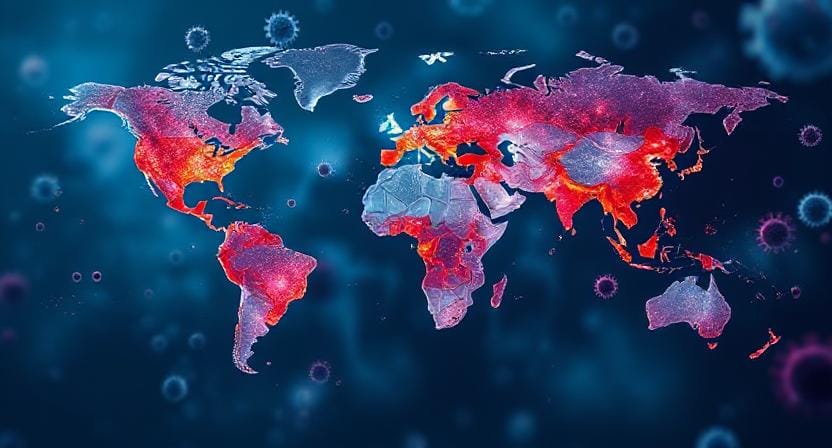Top Takeaways and Key Concepts
- Build a basic emergency supply of food, water, and medicine before a crisis begins.
- Stay informed using reliable health and safety updates to avoid confusion and panic.
- Create a communication plan to stay connected with family and community during emergencies.
- Support mental health by staying social, reducing stress, and seeking help when needed.
- Prepare an emergency kit that includes first aid, hygiene items, and survival essentials.
Summary of This Article
This article reflects on lessons learned from the COVID-19 pandemic and why emergency preparation is essential. It emphasizes stocking essential supplies wisely, staying informed, and maintaining clear communication with loved ones. The article also highlights the importance of strong community support and mental health awareness during uncertain times. By building an emergency kit, planning ahead, and staying connected, anyone can be better prepared for future crises with less stress and greater confidence.
Short Video Version of this Article
Wow, what a crazy ride COVID-19 has been. Isn’t that right? Instead of thinking about how to actually prepare for a pandemic, a lot of us were loading up on toilet paper. It’s kind of amusing today, but it was a little crazy back then.
Please Note: This post may contain affiliate links. If you click one of them, we may receive a commission at no extra cost to you. As an Amazon Associate, I earn from qualifying purchases.
Who would have guessed that a small virus could change everything? Life was normal one minute, and the next minute, we were all wearing masks and trying to stay away from each other. It honestly felt like being in a movie.

Let’s reflect about what we’ve learned as we look back. We need to get ready better for the next time. It’s true that everyone talks about having a backup plan. It seems good to have some munchies on hand, doesn’t it? You never know when you’ll need them!
Think of things like having extra food, drink, and maybe even medicine. It’s not hard, yet it makes a difference. Stocking up doesn’t imply going too far. Just being smart about what you could need.
We shouldn’t forget how important it is to talk to each other. It’s really important to stay in touch with family and friends. When things get rough, it’s incredibly helpful to make sure everyone feels connected. Even when you can’t be close, it feels like a giant warm hug.
Let’s remember these lessons when we get back to normal. The world can change very quickly. Getting ready helps us not feel so stressed out. Wouldn’t it be nice to be a little more ready for whatever comes next? Let’s do it together, with munchies in hand, plans in place, and smiles on our faces!
Understanding What Hit Us

Let’s dive into that big, unexpected visitor we all know—the virus that flipped our lives around. At first, I thought, “Oh, another flu season. No big deal!” But wow, as the news spread, it felt like my neighbor’s gossip was nothing compared to what was really happening. Scary, right?
Viruses don’t care about your BBQ plans or that dreamy trip to Hawaii. They’re like those friends who show up uninvited and stay way too long. Just when you think you’re good to go, bam! They crash the party.
Suddenly, we had to learn about how germs spread, like washing hands more than ever. Seriously, if only we could record “wash your hands” and play it on repeat! Remember how we all went into super-clean mode? Soap everywhere. Disinfecting everything. It was wild.
Trying to adjust felt tough at times. Panic shopping and finding empty shelves turned into a new normal. I know you felt it too. Everyone was scrambling. Imagine the toilet paper aisle—complete chaos. Funny now, but not so much then.
Thinking about it, what if we had been a bit more aware earlier? Just a little prep could have helped. Knowing these little lessons makes us stronger. We’ve learned that staying informed is key.
Every little bit helps. Let’s take this opportunity to remember. Being ready means we can better handle whatever comes next. Even if that means a stash of snacks and a hand washing routine! Feels good to chat about it, right?
Stockpiling Supplies Wisely

So, do you recall going to the store? It was something else to look at those bare shelves. It was like Black Friday, but instead of exciting goods, we were battling for frozen pizzas and hand sanitizer. That’s so strange, isn’t it? A mess at the grocery store without the sales.
When something bad happens, it’s simple to want to seize everything. But prudent hoarding requires knowing what you really need. It’s not enough to just stuff your cart. Pay attention to the most important things. You should go for non-perishables. Canned products, dry beans, and rice are great. You can fry them while you watch your favorite shows for the tenth time. You will be glad afterward that you did.
And don’t forget about hygiene items! You need those. Having enough soap is the best way to express “I’m ready for anything.” You want your hands to be clean and not look like prunes! It feels like you have a superpower when you wash your hands the right way.
Being ready is the key. We feel safer when we have a little extra of the appropriate things. Just picture making a warm lunch when everything outside is serene. That makes me feel good inside. Let’s be clever about what we really need next time. We can do this!
Communication is Key

Wow, we really learnt how important communication is during lockdown. I remember being so bewildered at the beginning of things. One minute they instructed to wear masks, and the next they said to “dance away from each other!” What do you mean?
When messages are clear, it makes everyone feel a little better. It’s like getting a report on the weather. You want to know if it’s going to be sunny or if a storm is coming. We were left wondering if we would have to dodge rainfall or just people instead.
Governments and health organizations really need to do more, don’t you think? It would assist if you got regular updates. It’s like getting your daily news, except instead of what to dress, it’s about how to keep healthy. More action, less confusion!
We all remember when social media was full of news and tips. But don’t forget about the good old town hall gatherings. Those were ways to talk and listen to each other. It’s really vital to keep everyone up to date. It changes terror into working together.
It makes things a lot easier if everyone knows what’s going on. We can do a better job of working together. Picture everyone working together and helping each other. That would be nice, wouldn’t it? We can do this!
Building Community Resilience

Yes, of course! When things get tough, community support is like the secret sauce. Do you remember the nice stories about neighbors preparing cookies and leaving them on their doorsteps? It made me feel warm within, like a warm hug. That truly made me think: why can’t that spirit be with us even after the chaos is over?
When people work together, good things happen. Everyone can benefit from setting up local networks. Consider groups that help each other or food banks. When things are tough, it’s important to have each other’s backs. Wouldn’t it be better to knock on a neighbor’s door for sugar instead of feeling like you’re in a zombie movie?
Everyone has something to offer. It could be a warm supper or just a nice talk. Small things can have a tremendous effect. I mean, knowing that a neighbor cares about you makes things simpler when you’re having a hard time, right?
Staying in touch is important. Community feels like a place to be safe. When we help each other, we all feel less alone. Think about how great it would be if every neighborhood did this. It’s like making a whole family, one cookie at a time. Isn’t it cool? Let’s keep that spirit going!
Mental Health Matters

Wow, “we’re all in this together” turned into a tune we couldn’t get out of our heads, didn’t it? It was true, but it didn’t always help with the heavy feelings that were going around. We would sometimes binge-watch Netflix to take our minds off of the decisions we had made in our lives. Oh no.
During COVID, mental health became a huge problem. Being alone was hard. A lot of people felt alone, even with all the TVs. It was hard, wasn’t it? Taking care of our thoughts is just as important as getting ready for the future. We need to check in on our feelings, just like we wash our hands.
Communities can do a lot. It is important to make it easier for people to get mental health care. Picture how great it would be if everyone knew they could ask for help without feeling bad about it. That would transform the game. When problems come up again, no one should feel alone.
A simple conversation, a nice ear, or even just talking about how we feel can make a big difference.
We can go through those hard times together. Making meaningful ties with others makes us all feel less alone. It’s about caring and checking in. That’s how we can actually be “in it together.”
Preparing Your Emergency Kit

You know, having an emergency kit isn’t just a good idea. It’s a must! Seriously, think about it. Survivalists know what’s up. Being prepared means having all the stuff you need close by. Like a cozy blanket and chocolate bars. Because hey, priorities!
Picture this: you’ve got band-aids for those little cuts and some pain relievers for when headaches hit. That stuff is golden. Non-perishable foods are a must, too—think canned veggies and snacks that won’t go bad. Oh, and don’t forget water purification tablets. No one wants to sip on iffy tap water when things get shaky. Yuck!
A good book is a nice bonus. Sometimes, getting lost in a story is just the escape we need. It’s like a mini-vacation from reality.
You can even put the kit together while watching your favorite show. Just toss in what you think you’d want most. It doesn’t have to be perfect. Just make sure it’s there when you need it.
Being ready for anything means you won’t have to scramble last minute. That feels good, right? Let’s go for it!
Conclusion: Moving Forward Together
Alright, I promise I won’t drag this out forever. We’ve learned so much from COVID-19, right? Those lessons are gonna shape how we deal with what’s next. Who knew we’d become experts in things like stockpiling? We should focus on the essentials, not just toilet paper!
Community support? Big deal. Remember all those neighbors helping each other? That needs to stick around. It’s nice knowing we’re not alone. And mental health? So important. We gotta make sure everyone can find support when things get tough. It really matters.
We need to take these lessons to heart but let’s keep our sense of humor. Because honestly, laughter helps so much. It makes hard days a bit brighter. And if you’re feeling unwell, laughter won’t replace a doctor. Just call someone who can help!
Let’s be ready for whatever life throws at us while keeping things light. That sounds pretty good, huh?
Featured Snippet: Emergency preparedness is about planning ahead before disaster strikes. By stocking essential supplies, staying informed, maintaining communication, supporting mental health, and building an emergency kit, individuals and families can respond to unexpected crises with confidence and reduce stress during uncertain times.
Frequently Asked Questions
What basic supplies should I store for emergencies?
You should store at least a two-week supply of non-perishable food, clean drinking water, necessary medications, and hygiene products. Include items your family uses daily to stay safe and comfortable during a crisis.
Why is communication important during a crisis?
A communication plan ensures you can stay connected with loved ones, share updates, and coordinate safety actions during emergencies, especially when phones or the internet may be unreliable.
How can I stay informed during emergencies?
Use trusted sources such as emergency broadcasts, local authorities, and public health agencies to receive accurate information. Avoid rumors and misinformation to prevent panic and confusion.
What should be in an emergency kit?
An emergency kit should include first aid supplies, flashlights, batteries, water purification tablets, multipurpose tools, hygiene items, and essential personal documents stored in a waterproof bag.
How does mental health affect emergency readiness?
Mental health is critical during crises because stress, anxiety, and fear can affect decision-making. Staying socially connected and seeking emotional support improves resilience and recovery.
How can communities support each other during disasters?
Communities can organize support networks, share resources, check on vulnerable neighbors, and provide encouragement. Working together increases safety and helps everyone recover more quickly.
What is the best way to prepare my family for future crises?
Create a family emergency plan, practice safety drills, stock supplies gradually, and review your plan regularly. Preparation builds confidence and ensures everyone knows what to do.
Suggested External Resources:
Pandemic Preparedness: Lessons Learned
https://www.cdc.gov/coronavirus/2019-ncov/community/pandemic-preparedness.html
How To Build an Emergency Kit
https://www.ready.gov/build-a-kit
Mental Health During Crisis Situations
https://www.who.int/teams/health-emergencies/integrating-mental-health-and-psychosocial-support-in-emergency-settings

Kevin Collier is a seasoned outdoor enthusiast and writer for Trekbug.com, specializing in outdoor adventures, survival strategies, and prepping insights. With a deep love for nature and a commitment to self-sufficiency, Kevin empowers readers to embrace the wilderness confidently. He shares valuable tips, practical techniques, and inspiring stories, helping both novice and experienced adventurers develop essential skills for surviving and thriving in the great outdoors.





